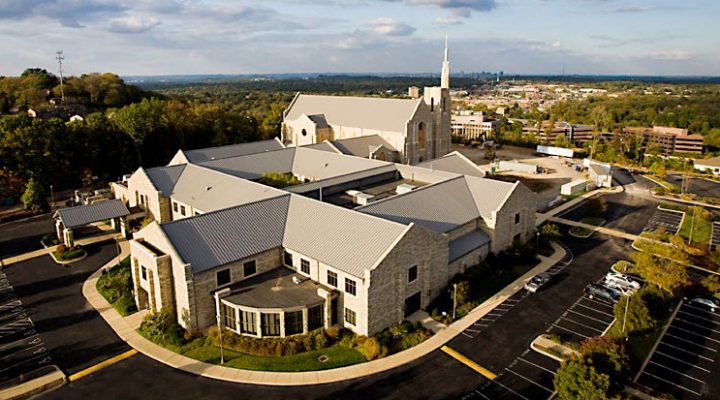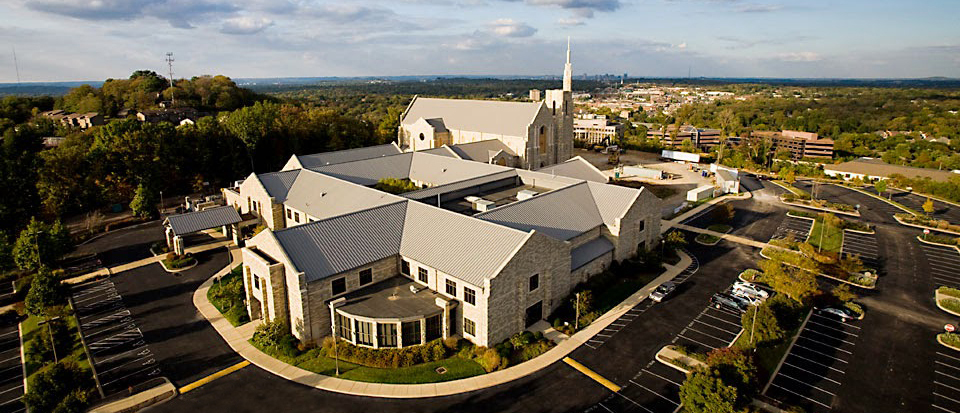Nashville is a city infused by religion, music and history, so when a tragedy like the school shooting at The Covenant School March 25 happens there, connections ripple across well-known names and places.
And in this case, also across some unknown history that makes things complicated to comprehend.
The Covenant School is affiliated with Covenant Presbyterian Church, a Presbyterian Church in America congregation situated in the tony south side of Nashville — just down the road from Bluebird Café, one of the city’s best-known live-music venues.
The Covenant School is a small, private Christian school, enrolling about 200 students in preschool through sixth grade. Tuition is about $16,000 a year — more expensive than a year of college at the University of Tennessee. The school was founded in 2001.
Covenant Church and its denomination represent the more conservative side of Presbyterian life in America today. The PCA was formed in the 1970s as a breakaway group from the better-known Presbyterian Church (USA), mainly over the ordination of women, which the PCA opposes.
Nashville — to the chagrin of some city leaders — is the namesake of a document important to some conservative evangelicals who embrace a theology known as complementarianism. This theology teaches that God created males and females for distinct roles in church and home, including allowing only men to be pastors. These beliefs are embodied in The Nashville Statement, orchestrated by a group called the Council on Biblical Manhood and Womanhood, which has strong ties to Southern Baptist Convention leadership but also adopted by the PCA.
“Because many other such churches no longer believe nor teach some of the basic truths of historic Christianity, we joyfully affirm our unity with those who believe in certain fundamentals of the Christian faith.”
The Nashville statement and PCA doctrine also are against LGBTQ identity and practice. In 2020, the PCA adopted a report on gender and sexuality that speaks of “the sinfulness of homosexual and transgender desire as well as conduct.”
The Covenant Church website (now disabled) explains: “Because many other such churches no longer believe nor teach some of the basic truths of historic Christianity, we joyfully affirm our unity with those who believe in certain fundamentals of the Christian faith.”
Conflict has dogged Covenant Church in the past. In 2016, the church fired its founding pastor, Jim Bachmann, after 25 years of service. The congregational conflict became a matter of concern to the denomination itself, which resulted in a church trial.
The reasons for the dispute did not appear to include any kind of moral failure or financial mismanagement but instead generalized leadership differences.
Bachmann’s successor as pastor, Chad Scruggs, lost his daughter, Hallie Scruggs, in the school shooting, CBS News reported.
It was Bachmann who also started the The Covenant School on the congregation’s site on Redbud Hill, part of the land where the Battle of Nashville played out in 1864 — a decisive battle in the U.S. Civil War. Later much of that land would be owned by singer Amy Grant’s great-grandfather, A.M. Burton, a wealthy Church of Christ layman and insurance executive.
While Grant recently made headlines for hosting a same-sex wedding for her niece on the family’s farm in nearby Franklin, Tenn., the land now occupied by Covenant Presbyterian Church and The Covenant School will be used for no such purpose.
The strict gender and sexuality theology of the church and school may have played some role in the experience of the shooter, whose parents had rejected the 28-year-old’s assertion of being both gay and transgender.
Drake said investigators believed the shooting stemmed from “some resentment” the suspect harbored “for having to go to that school” as a younger person.
The Guardian newspaper reported: “Nashville’s chief of police, John Drake, told NBC Nightly News with Lester Holt that the shooter had planned to attack several different places, saying a manifesto belonging to the suspect ‘indicates that there was going to be shootings at multiple locations, and the school was one of them.’ Drake said investigators believed the shooting stemmed from ‘some resentment’ the suspect harbored ‘for having to go to that school’ as a younger person.
What that “resentment” might be has not been explained.
Forbes reported: “Writings law enforcement obtained from the shooter showed the alleged attack was ‘calculated and planned,’ but (the shooter) did not have any specific targets of victims, and police found ‘detailed’ maps planning the shooting as well as additional firearms when they searched (the shooter’s) house.”
Former Covenant School headmaster Bill Campbell told NBC News the shooter had attended the school in third and fourth grade, in 2005 and 2006.
While most news reports are highlighting some kind of significant mental illness for which the shooter was seeking medical help, the transgender identity component — apart from any mental illness — has been perplexing to those who study mass shootings. The Covenant murders are unusual because the target was a private school, not a public school, and because the shooter was not born male.
The Covenant murders are unusual because the target was a private school, not a public school, and because the shooter was not born male.
In this mix of confusion, ABC-7 News in Nashville reported the leader of a transgender youth education organization took to social media a day after the shooting suggesting religious schools like Covenant need to be regulated.
Eli Erlick is a transgender activist and co-founder of Trans Student Educational Resources who claimed The Covenant School is a “right-wing institution” in which the shooter and other students were “abused.”
As evidence of this “abuse,” Erlick pointed to a 2014 blog written by Oklahoma Baptist pastor Wade Burleson, who detailed how a leading layman in Covenant Presbyterian Church — the man who designed the Covenant School logo with the Latin phrase Veritas Christo et Ecclesia (“Truth for Christ and the Church”) — was facing persecution from church leaders, whom he accused of covering up sexual abuse of minors by a deacon in the church.
That alleged abuse happened in the early to mid-2000s, which would correspond with the time this week’s 28-year-old shooter was involved in the school and perhaps the church. No direct link has been stated between this alleged abuse and the shooter. Whether the shooter attended the church as well as the school is not known.
What is known is that Pastor Bachmann and other church leaders were accused of mishandling the knowledge of this alleged child molester, who because of his position reportedly had free reign at the church and the school. And it is also public record that the church engaged in a long-running dispute with the church leader who sounded an alarm about the abuse, a man named Austin Davis, who eventually was barred from attending the church. In a twisted irony, church leaders portrayed Davis as a “possible shooter” and a threat to the congregation and the pastors.”
In a twisted irony, church leaders portrayed Davis as a “possible shooter” and a threat to the congregation and the pastors.”
As it turns out, Davis was neither. But his reputation was ruined after he attempted to attend church as he had done for 18 years, Burleson wrote: “He was accosted by men with guns, separated from his wife and children, and threatened to be thrown in jail if he ever set foot on the property again, even though the Nashville police were never called to the church property. The actions were taken by a ‘private’ security team. The entire experience was humiliating.”
According to Burleson, it took another two years for church leaders to acknowledge the truth of the child molestation charges and to excommunicate the accused deacon.
All this would come to have a substantial influence on the Southern Baptist Convention, too.
Burleson explained: “In the summer of 2007, when Covenant leadership became aware of the allegations of molestation against one of their church officers, I stepped to the microphone at the Southern Baptist Convention and made a motion that: ‘A database be developed containing the names of all Southern Baptist ministers who have been credibly accused of, personally confessed to, or legally been convicted of sexual harassment or abuse, and that such a database be accessible to Southern Baptist churches.’
“Though I am not a Presbyterian, my motion was rooted in the knowledge that there is a tendency within religious denominations to ‘conceal and cover’ sexual abuse by church officers and ministers out of concern for the ‘reputation’ of the church,” Burleson said, adding that TIME magazine declared the failure of his motion “one of the Top 10 most underreported stories in the nation” that year.
It would take another 15 years for the SBC to adopt a motion calling for an investigation of mishandled knowledge of sexual abuse and why it was not possible to create a database of known sexual abusers in Southern Baptist churches.
That motion was made and adopted at the Nashville convention center, just 8 miles away from Covenant Presbyterian Church.
Related articles:
Baptist church jumps into service as reunion point for Covenant School children and parents
School shootings: How can we respond to children, parents, teachers and others affected? | Opinion by Brad Schwall


